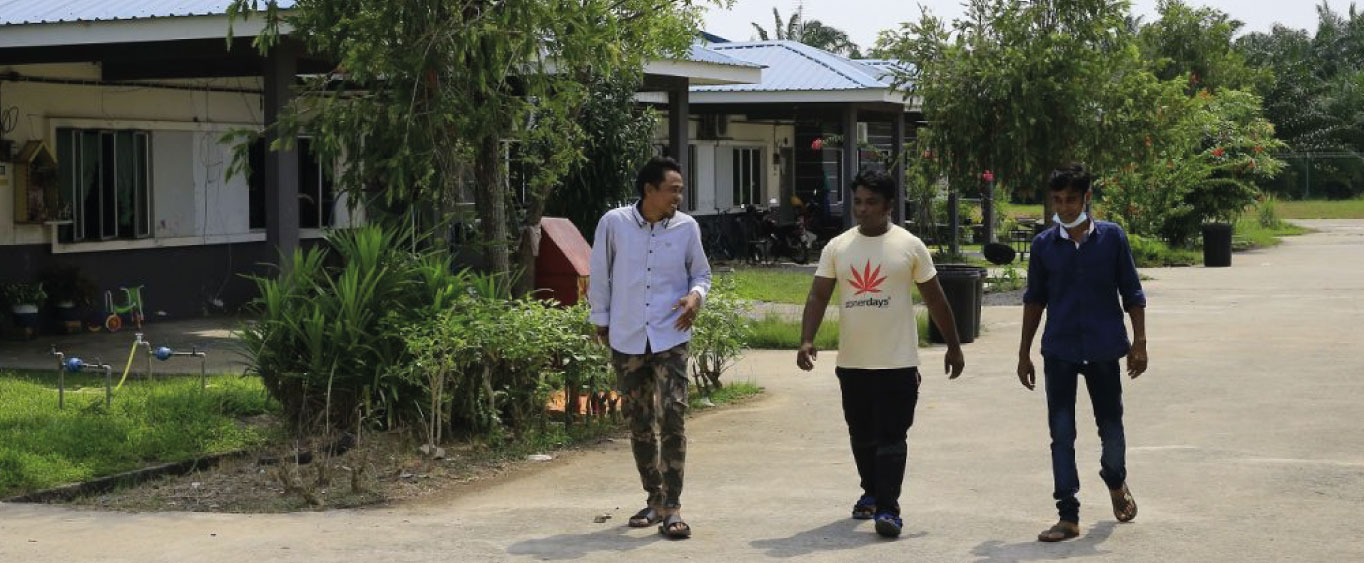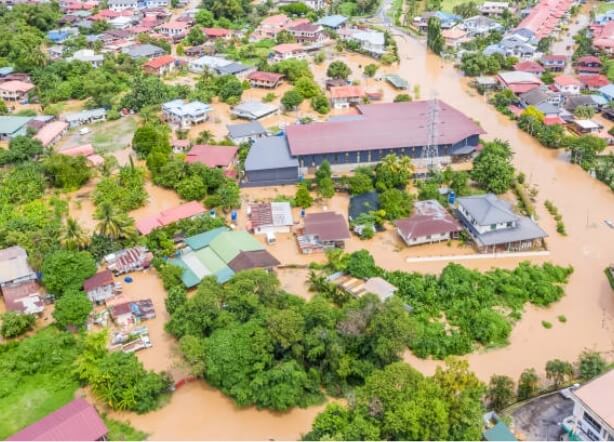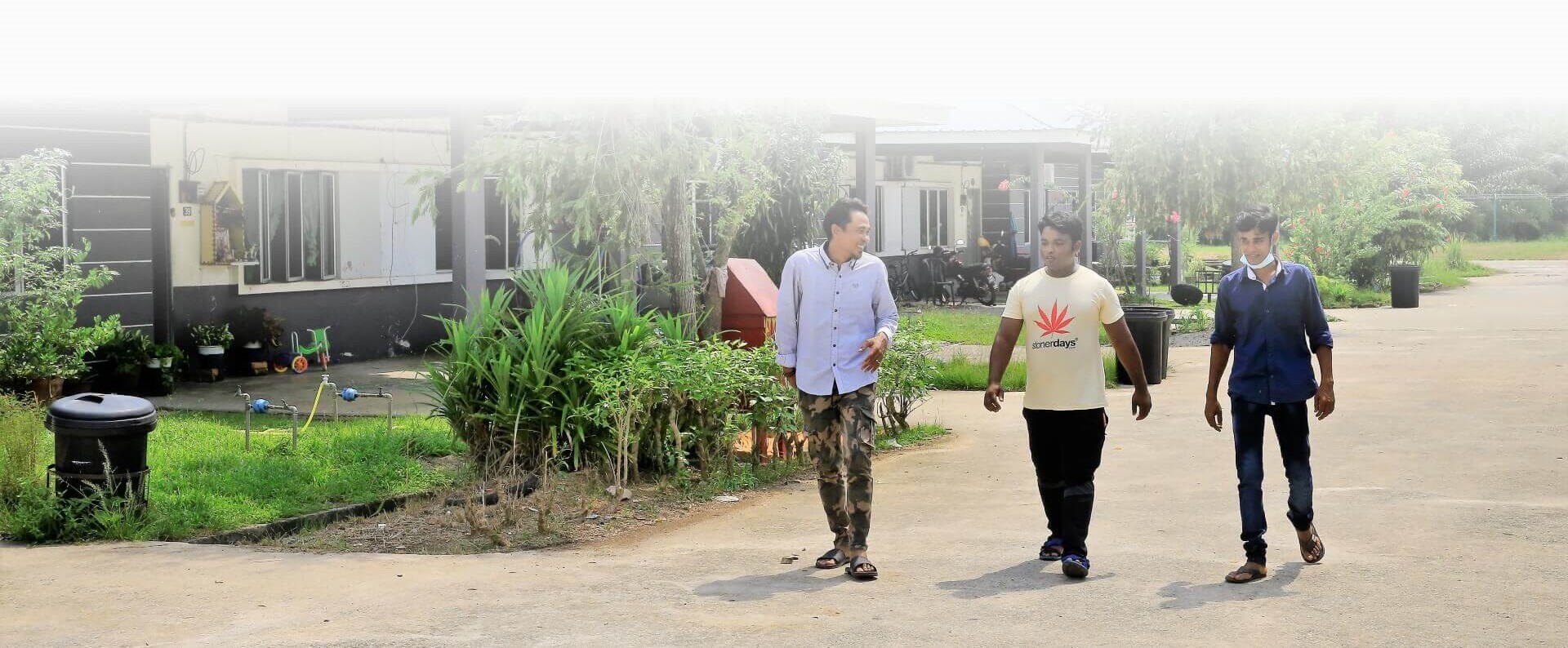Engaging and Empowering Communities

[GRI 3-3, 203-1, 203-2, 413-1, 413-2]

SDP operates over 240 plantations in remote rural areas across Malaysia, Indonesia, and Papua New Guinea and Solomon Islands
It is imperative that we work in partnership with local communities surrounding our operations. As part of our efforts to promote a just transition, we treat our proximity to these communities as an opportunity to promote sustainable development within our plantations and in adjacent areas. Our efforts include building and re-building infrastructure and facilities such as roads, community halls, and health centres to improve or provide access to basic needs like clean water, sanitation, and education. We also aim to support local communities through our operations by providing job opportunities, economic growth initiatives, and alternative livelihood training. We allocate significant resources to local community engagement and partnerships. This approach supports the success of our business but, more importantly, has a lasting impact on improving people’s welfare and livelihoods.
Upholding rights of communities
[GRI 3-3, 411-1]Due to our strict No Deforestation commitments, we have not developed any land in Indonesia and Malaysia for many years. Our only areas of expansion have been in Papua New Guinea and Solomon Islands, which have low carbon developments in line with the requirements from the RSPO New Planting Procedures and the HCSA. We actively engage with local community leaders and members before any land development to obtain Prior and Informed Consent (FPIC) from communities. This approach ensures that communities impacted by our projects are well informed and that we have obtained permission from landowners who hold legal and customary rights. Our actions are informed by effective conflict resolution frameworks based upon social impact assessments and periodic stakeholder consultations carried out by independent third parties. All our operations conduct regular formal and informal engagements with all local stakeholders, especially at those locations where communities are most affected by our projects.
97% of the land in PNG and 87% of land in Solomon Islands are controlled by the communities.
The reality in PNG and Solomon Islands is somewhat different. We are heavily dependent on communities that control over 97% of the land in PNG and 87% on Solomon Islands. Because most of our landbank is leased by customary landowners, we have adapted our approach to better fit this reality by establishing a due diligence process that truly represents the rightful and customary landowners. Aside from respecting FPIC, we work closely with community members, specifically Incorporated Landowner Groups (ILGs), to determine how to use the land so communities can benefit from our activities. In addition to maintaining a participatory approach to land-use planning, we support landowners with training programmes on practical issues such as intercropping, sound agricultural practices and financial literacy.
In the first quarter of 2020, SDP sold a 100% stake of our equity interest in Sime Darby Plantation Liberia Inc. (SDPL) to Mano Palm Oil (MPOI). During the course of our ownership, 17 communities filed land-ownership complaints to the RSPO. This was despite carrying FPIC protocols in accordance with RSPO requirements prior to commencing operations in 2009. Whilst the complaints were withdrawn in 2012 following our engagement with The Forest Trust, the organisation helped us develop clearer consent guidelines that serve the best interests of these communities. We continued to work closely with NGOs, the Government of Liberia, the United Mission in Liberia, and the World Bank to collectively address the issues raised to ensure effective engagement and active participation with the affected communities. In 2013 and 2015, agreements were signed with two communities to improve community inclusion and provide compensation. Despite our best efforts, we continued to face challenges, including theft, illegal mills, illegal squatters and land encumbrances. These challenges hampered our ability to plant crops, leading to just 10,300 hectares of development of the total 220,000 hectares, which led us to the sale.
We are acutely aware that indiscriminately handing over our operations to any seller would risk undoing years of groundwork with local communities. As part of our divestment exercise and exit plan, we performed due diligence to ensure the sale to a responsible buyer that will continue SDP’s foundational work with local communities. The new owner has committed to an outgrower programme and to developing the upstream and downstream segments of the business with the best interests of local communities in mind. SDP completed a 12-month post-handover transition, including providing technical expertise to the new owner.
Similarly, in 2019 we divested our interest in PT Mitra Austral Sejahtera (PT MAS) in West Kalimantan after years of working with communities to address land rights issues regarding land status, partnership agreements, and breaches to customary rights raised in 2007. During these years of close engagement and dedication to resolving the RSPO complaint, we made significant progress towards resolving these complex issues. We believe the new owner of PT MAS, PT Inti Nusa Sejahtera, has the capacity to continue assisting local communities in furthering their interests. The sale included a list of conditions that provides additional benefits to the local economy and surrounding local communities.
As of December 2021, the RSPO case raised against our subsidiary by the communities of Sanggau (Kerunang and Entapang), Transparansi untuk Keadilan (TuK) remains open. Since 2019, there have been multiple delays in the legal review process and receiving inputs from the complainant. In July 2021, the Complaints Panel issued a final directive that it will deliberate pending the completion of an independent legal review and the delivery of follow-up documentation. We continue to support the resolution of outstanding issues expeditiously through the RSPO system.
More information on both divestments is available in our 2019 sustainability report, pages 66–67.
The latest updates to the RSPO PT Mas case can be found here.
Community Development
[GRI 3-3, 203-1, 203-2]SDP has founded philanthropic arms or developed programmes in each country where we have upstream operations that offer a wide range of programmes in local communities in and around our operations. The Sime Darby Foundation, for example, is governed by a Governing Council with members including our Group Managing Director and managed by a dedicated team. In 2020 and 2021, many of our efforts focussed on providing community support based on challenges brought about by the COVID-19 pandemic.
Malaysia
In Malaysia, Yayasan Sime Darby (YSD) or the Sime Darby Foundation – is the joint philanthropic arm of Sime Darby Plantation Berhad (SDP), Sime Darby Berhad, and Sime Darby Property Berhad (our former parent and sister companies). The foundation’s social support initiatives include promoting education and offering scholarships to deserving students, promoting the rights and well-being of marginalised communities, improving communities’ access to healthcare, and assisting communities with disaster relief and prevention. The foundation also funds impactful conservation programmes and world-class scientific research by developing highly competent local scientists, researchers, and custodians.
1,160
Affected families
950
Families assisted
74
Orang Asli families
4
Focussed schools

Relief for extreme floods in Malaysia
In December 2021, Peninsular Malaysia experienced heavy downpours for several days, resulting in unprecedented floods affecting eight states, SDP’s operations, and communities surrounding us. Together with YSD, SDP provided aid and assistance, including food supplies and essential items, medical attention, and other on-the-ground aid to meet the immediate needs of local communities in the aftermath of the tragedy. SDP also worked closely with other NGOs in helping the affected areas to ensure that all aid reaches these communities.
We continued to supply aid to flood-impacted workers within our operations and surrounding community members, ensuring their well-being and provided for their immediate needs. As of December 2021, SDP has identified over 1,160 families in the affected areas and delivered assistance to over 950 of them, including 74 families in Kampung Sg. Kurau - an Orang Asli village in Carey Island. In addition, SDP also identified four schools in Carey Island for post-flood relief efforts.
Indonesia

Supporting children’s education in Indonesia
In 2019 and 2020, Minamas awarded six students a year with full scholarships amounting to IDR250 million through our Minamas Cares programme. The scholarships will allow these students to pursue palm oil industry-related tertiary studies. In 2021, we allocated an equal amount of funding to pay the tuition fees of 25 deserving students.
Papua New Guinea and Solomon Islands
The NBPOL Foundation in Papua New Guinea and Solomon Islands supports surrounding communities at our operations through donations and contributions to community-based projects and enhancements to education and health establishments. In 2013, NBPOL launched the One-Hour Principle, an initiative to ensure that communities have access to schooling, potable water and health services within a one-hour walk. The Foundation’s efforts are focused on meeting community needs whilst also addressing the priorities set out in the UN Sustainable Development Goals and the Papua New Guinea Vision 2050.
More information of our philanthropic support can be read in the Yayasan Sime Darby Annual Report 2021.

